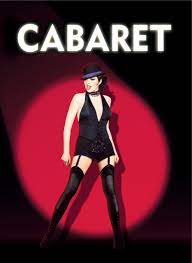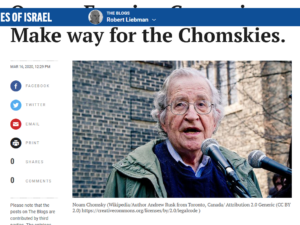Scroll down to see all posts. To view posts on a specific topic, click on that topic in the Categories sidebar. This website now includes posts that originally appeared in my worldwartwopix.com website.
Truth Lies Here
World War Two Photographs
“I don’t think the camera lies.” Susan Sontag, writer.
“In one way or another, the camera always lies.” Norman Davies, historian.
“Under Stalin’s regime…photographs lied.” Stephen F. Cohen, historian.
“Photographs can’t do the moral or the intellectual work for us. But they can start us on our way.” Susan Sontag.
The Red Army Camel
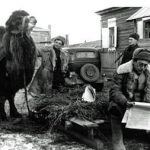 Kuznechik, a camel, followed the Red Army’s 308th Rifle Division from Stalingrad (1942/3) to Berlin (1945), according to A Writer at War, Vasily Grossman, by Antony Beevor.
Kuznechik, a camel, followed the Red Army’s 308th Rifle Division from Stalingrad (1942/3) to Berlin (1945), according to A Writer at War, Vasily Grossman, by Antony Beevor.
German Posters in English
You Talking to Me?
 On April 1, 1933—only two months after Hitler became German Chancellor, and five years before Kristallnacht—the Nazis organized a nationwide boycott of Jewish businesses. And they made sure that shoppers got the message.
On April 1, 1933—only two months after Hitler became German Chancellor, and five years before Kristallnacht—the Nazis organized a nationwide boycott of Jewish businesses. And they made sure that shoppers got the message.
Continue reading
Hitler’s Bomb-Damaged Trousers
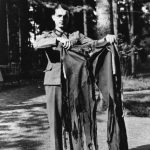
A solid wood table probably saved Hitler’s life on 20 June 1944 when Count Stauffenberg attempted to kill the Fuhrer with a bomb hidden in a briefcase.
Hitler’s trousers give some indication of the force of the blast.
Christopher Isherwood Shoots Weimar Berlin
Posted 25/2/2014
Weimar Out, Nazis In
Robert Liebman
For British novelist Christopher Isherwood (1904-86), Berlin during the Weimar era held more appeal than London. Until Hitler arrived.
In 1929, Isherwood moved to Berlin, lived in rented rooms, taught English to support himself, and kept a diary which served as the basis for his short-story collection Goodbye to Berlin (1939).
The publication date is deceptive. He wrote most of the stories in the early 1930s before Hitler became Chancellor but while the Nazis were rising in power—and Hitler’s followers, the feral Brownshirts, roamed the streets. Isherwood captures the ethos of a German capital undergoing massive change. By the time (January 1933) Hitler became Chancellor, Isherwood’s Berlin sojourn was effectively over. Continue reading
The Yiddish Bermuda Triangle
Schloime, Meet Nachum; Saul, Meet Norman
by Robert Liebman
(Posted 23 February 2024)
The famous Bermuda Triangle swallows ships—supposedly.
The less well known Belarus-Latvia-Lithuania Triangle produces great Jewish-American writers—for real.
Continue reading
The Jewish Daughter
Posted 30/1/2024
Polina, Molotov’s Jewish Wife
Robert Liebman
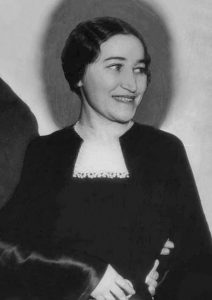 Hitler needed it, to pave the way for his powerful Wehrmacht to attack Poland. Stalin needed it, to buy time to bulk up his Red Army.* On 23 August 1939, their foreign secretaries delivered it: the non-aggression Ribbentrop-Molotov Pact.
Hitler needed it, to pave the way for his powerful Wehrmacht to attack Poland. Stalin needed it, to buy time to bulk up his Red Army.* On 23 August 1939, their foreign secretaries delivered it: the non-aggression Ribbentrop-Molotov Pact.
Bitter enemies—Communist Soviet Union and Fascist Germany—instantly became allies.
A week later, on 1 September, Germany invaded Poland. The Second World War in Europe had begun.
Continue reading
Kosher Nobels
Nobel Prizes for Literature: An Explosive Mix
Robert Liebman
 In literature as in the sciences, a disproportionately high number of prizes have gone to Jews.
In literature as in the sciences, a disproportionately high number of prizes have gone to Jews.
This particular collection is a bit meshuganah.
Continue reading
Photographers and World War II
Shot by a Jew
By Robert Liebman
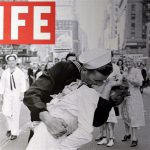 A gaggle of American GI’s (Government Issue = soldier) raise the Stars and Stripes on a bomb-damaged hilltop.
A gaggle of American GI’s (Government Issue = soldier) raise the Stars and Stripes on a bomb-damaged hilltop.
A sailor and a nurse enjoy a passionate kiss in Times Square.
General Douglas MacArthur returns, knee-deep, to the Philippines.
The truly iconic photographs from the Second World War are instantly familiar. We can picture them from a brief description alone; we do not actually need to see them. Continue reading
Broadway: Birth, Bar Mitzvah and Beyond
Broadway Bubbies
By Robert Liebman
The entrepreneurs who launched America’s movie industry a century ago are household names today, men such as Szmuel Gelbfisz, Karl Laemmle and Adolf Zukory.
Gelbfisz? Laemmle? Zukory? Household names? In whose house?
Szmuel Gelbfisz preferred to be known as Samuel Goldwyn and, with Marcus Loew and Louis B. Mayer, formed MGM. Adolph Zukory dropped his Novelty Fur Company and the last letter of his surname to run Paramount Pictures. Bored with office work, Karl Laemmle created Universal Pictures.
Continue reading
Crown Jewels
Rabbi Grandpas for Genes, Paris for Inspiration
Schemers and Dreamers, Ids and Yids
In October 1947, a Jewish-American writer, grandson of a Russian rabbi, completed page 721 of his 721-page novel and set off for a year in Paris with his wife. First novel. First wife.
His novel, published while he was in the French capital, met with widespread acclaim and he started a new novel, which he completed after returning home to New York. Short where his first novel was long, symbolic instead of realistic, and with a skimpy contrived plot, novel number two fell flat on its face.

When he died at the age of 83, his totals were ten novels, six wives and numerous awards—but the gong he yearned for most eluded him.
In September 1948, another young Jewish-American writer (the born-in-Canada variety), also the grandson of a Russian rabbi, went to Paris with his first wife. He already had two accomplished but modest novels under his belt and was well into his third. He never finished it. Instead, he abruptly ditched it and started an entirely new work which he completed after returning to America several years later.
His original third novel, the one he jettisoned, would have been in the same competent but dreary league as his previous novels. His new work was a different species altogether, stylistically as well as in subject matter. It provided him with a lush new vein and he mined it to the hilt. When he died, aged 95, his tally was 13 novels, a mere five wives, and one Nobel Prize.
The futures for both writers turned on the novels they started in Paris, but why did this most inspirational of cities prove poisonous for one of them and magical for the other? Continue reading
Gravestones
Hands Up!
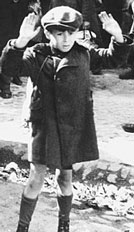 This haunting image of a boy too young to be a menace to anyone is familiar as a stand-alone portrait. However, it is actually part of a group shot portraying SS men as well as their Jewish prisoners in the Warsaw Ghetto. Israeli President Menachem Begin (1913-92) had a copy on his desk.
This haunting image of a boy too young to be a menace to anyone is familiar as a stand-alone portrait. However, it is actually part of a group shot portraying SS men as well as their Jewish prisoners in the Warsaw Ghetto. Israeli President Menachem Begin (1913-92) had a copy on his desk.
About a dozen individuals are potentially identifiable from the original photograph, and there are several candidates for the boy with his hands up. Only one person has been definitely identified in the larger group.
The Bleeding Infant on Bloody Saturday
 An infant—traumatized, possibly injured and abandoned—was one of many victims when Japanese bombers blasted Shanghai South train station to smithereens in August 1937. “Bloody Saturday.”
An infant—traumatized, possibly injured and abandoned—was one of many victims when Japanese bombers blasted Shanghai South train station to smithereens in August 1937. “Bloody Saturday.”
We know the photographer: H. S. Wong (a.k.a Wong Hai-Sheng, Wang Xiaoting and by his nickname “Newsreel”). The baby’s identity, and fate, is clouded by various competing narratives. Continue reading
The Chomskies: The Award You Can Award to Yourself
Patton’s Pesky Pistol
 Before he reached the Rhine River in Germany, Patton bestrode the Seine in France and marked his territory: “Patton, after a flying visit, proudly announced to Bradley that he had ‘pissed in the river that morning.'” Antony Beevor, D-Day, quoting Martin Blumenson, ed., Patton Papers. See Patton Pis for more information.
Before he reached the Rhine River in Germany, Patton bestrode the Seine in France and marked his territory: “Patton, after a flying visit, proudly announced to Bradley that he had ‘pissed in the river that morning.'” Antony Beevor, D-Day, quoting Martin Blumenson, ed., Patton Papers. See Patton Pis for more information.
Patton Pis – Photos from Matt
Patton Pis pix from a personal collection. For more information, see the comments at the bottom of Patton Pis.
The Zionist Colonial Navy
Zamzam and a Photographer’s Revenge
Abandon ship! Carrying civilians in 1941, the Zamzam was attacked and disabled by Atlantis, a German raider. A cunning photographer led to eventual revenge.
Hitler’s Bathtub: Soap, Sass and Sex
The bathtub? Adolf Hitler’s.
The beauty in the tub? Lee Miller, an American-born model, artist, photographer, and wartime photojournalist for British Vogue.
Sailor and Nurse Kiss
VJ-Day—Victory over Japan.
The good news was so good that they sealed it with a kiss. But who is the kisser—and who is the kissee?
The Three Mistakeateers
Alexandria Ocasio-Cortez. Ilhan Omar. Rashida Tlaib. Three new American congresswomen, a shedload of mistakes.
https://blogs.timesofisrael.com/the-three-mistakeateers-ocasio-cortez-omar-tlaib/
Israel’s Jig is Up
https://blogs.timesofisrael.com/israel-the-jig-is-up-because-the-end-is-nigher/
Roger Waters, Richard Falk, chronic hatred and a dose of reality.
Identical Twins Reared Apart

The Contenders:
“As a Jew…” v “We the undersigned….”
The Contest:
Mirror mirror on the wall/Who is the smarmiest of us all?
“As a Jews” have an at-best tenuous link to the Jewish religion but invoke it cynically and dishonestly in political discussions. (On questionnaires I suspect most of them fill in the Religion line with ‘none’ or ‘atheist’)
“We the undersigneds” are superficially secular but are actually as faith-based as the “As a Jews,” maybe more so.
Obediently following the progressive line—”No enemies on the left”—they demand ‘rights’ and ‘justice’ for the Palestinians.
If, once, they could actually provide rational and compelling evidence—which rights, which injustices, and crucially, who is truly culpable?—instead of periodically repeating, mantra-like, these buzz words, the case would be closed. They could declare victory, and spare us their blooming letters.
Anti-Israel leftists insist on key emotive words—rights; justice; ethnic cleansing; pinkwashing—and the self-styled progressive flock intones them, in letter after letter after letter. Their obedience is sheep-like, and why not: they have much to lose. Express one doubt, make one false move, and your fellow progressives label you a ‘fascist.’ You are drubbed out.
Mirror Mirror Contest result: Dead heat.
Next contest: Big prizes for anyone who correctly guesses tomorrow’s new progressive buzzword.
Hertzberg on Perry
Oopsday at Rancho Perry
Hendrik Hertzberg gathered a pile of Perry poop for his New Yorker magazine article (January 30, 2012)
At Rancho Perry, every day was Oopsday. Along the trail, he forgot how many Justices the Supreme Court has (eight is not enough); forgot the name of one of them (Sonia Sotomayor); placed the American Revolution in the sixteenth century; identified the voting age (fixed at eighteen four decades ago by constitutional amendment) as twenty-one; and suggested that the chairman of the Federal Reserve is a traitor, that Turkey (a nato ally of sixty years’ standing) is governed by Islamic terrorists, and that Social Security is not only a Ponzi scheme but also a criminal enterprise, a monstrous lie, and unconstitutional. And there’s this whopper, from his farewell speech: “As a former Air Force pilot, I don’t get confused.”
Gaffe Collection Gaffe Gumbo: A U.S.A. Miscellany

